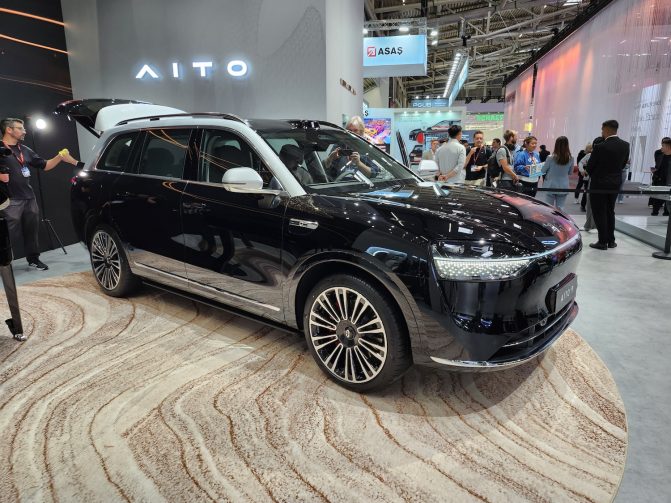In the ever-evolving world of automobiles, Chinese carmakers have begun to challenge long-standing luxury rivals, shifting the global automotive landscape in exciting ways. While early attention focused on more affordable vehicles, China’s ambitions now extend into the luxury segment—previously dominated by stalwarts such as BMW, Mercedes-Benz, and Audi. For Nigerian motorists following these trends, there’s fresh intrigue around a new contender: AITO. Recently unveiled at the IAA Mobility Expo in Munich, this up-and-coming luxury brand is making significant moves, unveiling sleek vehicles brimming with innovative tech, sophisticated electric drivetrains, and a unique range-extender system. The implications for drivers, car importers, and the broader automotive sector in Nigeria and West Africa are substantial, signaling a possible shift in both preferences and market competition.
AITO may still be a relatively new name globally, but its rise in Asia—particularly China—has been remarkable. Since its founding in December 2021, reports indicate that AITO has surpassed 770,000 units in cumulative sales across its four models in China alone. This impressive pace even outshines the early achievements of some established luxury brands in their first years. The company’s flagship model, the AITO 9, a large high-end SUV launched in late 2023, has already logged over 230,000 units sold, according to data cited by Seres Group. Even more notable is that the AITO 9 has consistently topped China’s competitive ¥500,000-level luxury car market for 17 straight months—an extraordinary feat in a rapidly changing marketplace where premium vehicles often face fierce domestic and foreign competition.
With a firm foothold in China, AITO’s focus is now expansion—including into the lucrative luxury markets of Europe and, notably, the Middle East. For African observers, these moves are worth tracking closely; premium Chinese brands may soon target Nigeria, Ghana, and other key economies. At IAA Mobility 2025, the brand made its global debut for all-new Middle East versions of its SUVs: the entry-level AITO 5, the family-friendly AITO 7, and the spacious, three-row AITO 9. Each model addresses particular needs—urban compactness, family utility, or full-blown luxury—mirroring the variety that Nigerian car buyers increasingly demand as urban areas like Lagos, Abuja, and Accra grow more sophisticated.
Emergence of a New Player in Luxury Mobility
At the Munich event, AITO also revealed the AITO 8—a slightly smaller SUV with features similar to the AITO 9, including optional three-row seating. However, the AITO 8 is, for now, a China-exclusive offering. The main international focus remains on the 5, 7, and 9 SUVs. Journalists in Munich were given a closer look at these vehicles, as well as an overview of AITO’s ambitions for the years ahead. The message was clear: AITO is no mere imitator. According to a senior Seres Group spokesperson, “We are determined to redefine the luxury market with genuine innovation, performance, and value.”
From a design perspective, AITO SUVs feature styling tailored to Asian tastes but with global appeal—bold grilles, sleek lines, and interiors finished with premium materials. The AITO 9, in particular, pushes boundaries: at the rear, a slide-out shelf reveals power-folding leather seats and an integrated fridge—complete with spaces for champagne bottles. Such attention to detail is reminiscent of European luxury, yet offered at what industry insiders speculate to be a more accessible price point. In the context of Nigeria, where buyers increasingly crave both functionality and status, such features may resonate, especially among upwardly mobile families or business professionals.
At the front, the cockpit bristles with digital displays and tech-forward controls—a nod to China’s leadership in car infotainment and smart systems. The surge in demand for connected and intelligent vehicles among young Nigerian and Ghanaian drivers could make these features particularly desirable.
While full technical specifications remain under wraps, it’s understood that the latest trio—the AITO 5, 7, and 9—are all built on the AITO MF Platform. This flexible architecture allows for multiple propulsion options—a significant point of differentiation. Additionally, AITO’s debut of the SERES 5th-generation Super Range-Extender System marks another innovation. This advanced powertrain, based on Seres Group’s “Saiyi C2E Range-Extender Integration Design” and the futuristic “RoboREX Intelligent Control Technology,” blends performance, efficiency, and low noise. For regions like Nigeria, where range anxiety and charging grid limitations can hinder electric vehicle adoption, such solutions could prove transformative.
Industry analyst Abimbola Oladipo of the Abuja Automotive Research Institute told us, “The reality is that while Nigerians are open to new brands, reliability, after-sales support, and real-world efficiency—in both traffic and long-distance travel—will be key for widespread acceptance of these luxury EVs.”
Powering the Future: EV Options That Fit Local Realities
AITO’s MF Platform is designed to accommodate a range of propulsion systems, giving buyers options: super range-extended electric, battery electric (BEV), or hybrid. In practical terms, Nigerian and West African motorists could someday choose between a pure EV, a hybrid, or an electric vehicle with a petrol-powered range extender—ideal for cities with inconsistent power supply or sporadic charging infrastructure. According to company literature, this flexibility is a deliberate response to the diverse needs of different markets.
AITO has also localized key features for new export markets. For its Middle East models—which could foreshadow African variants—the company included Arabic, Chinese, and English language support in the vehicle interface, with an eye on future additions for other emerging markets. The brand claims its systems are tightly integrated with local digital ecosystems, enhancing usability for consumers accustomed to apps and services tailored to national contexts.
Equally important is durability. According to AITO sources, the SUVs underwent stringent stress testing in harsh environments, such as desert heat, to ensure they remain reliable under extreme conditions—something that would encourage Nigerian drivers wary of imported vehicles that sometimes struggle with local weather.
The AITO 5, 7, and 9 SUVs are reportedly cleared for sale in the UAE and may soon follow in other right-hand drive or emerging markets. Industry observers in Lagos note that Nigerian auto dealers are keenly watching this trend, especially as government policy steadily pivots towards greener mobility and increased auto assembly capacity within the country.
AITO further boasts substantial real-world data on its assisted-driving features. Company stats claim that, by August 2025, its intelligent driving systems had achieved over 3.45 billion kilometers with more than 621,000 users in China. Such a track record, while still unseen in West African markets, could build trust as driver-assist technology grows more common globally. If and when these features are rolled out across Africa, regulatory frameworks and local customization will be crucial. Mobility columnist John Mensah from Accra pointed out, “Adaptation to local road conditions and affordable support services will make or break these launches in Ghana or Nigeria.”
To earn customer confidence, AITO plans robust after-sales support—reportedly including a new UAE-based subsidiary, local warehouses, and supply chains, plus promises of support infrastructure in every new market entered. For Nigerians, the difference may ultimately come down to whether parts and servicing are as accessible as those of Japanese or German brands, which have earned loyal followings over decades.
While awareness of AITO remains relatively low in West Africa for now, the groundwork being laid by Seres Group and its expansion partners suggests that could soon change. For Nigeria’s upper-middle-class families and businesses looking to combine comfort, tech-savviness, and environmental awareness, AITO’s stated offerings provide an exciting prospect. Still, as the influx of Chinese vehicles continues to stir up the auto import market, questions remain over tariffs, local manufacturing opportunities, and long-term durability.
What will ultimately determine AITO’s success across Nigeria, Ghana, and the broader African market? Some experts believe collaboration with local dealers and service centers, aggressive pricing, and public demonstration of reliability will be essential. Others caution that entrenched preferences for used vehicles—often imported from Europe or the US—will be tough to overturn without clear advantages in both technology and after-sales care.
As electric and hybrid vehicle options grow, Africa stands at a crossroads. Will the region embrace these truly global newcomers, or will established brands continue to rule Nigerian roads? Only time—and the firsthand experiences of local drivers—will tell.
Are you open to Chinese luxury cars like AITO, or do you prefer the familiar brands? What features matter most for you—affordability, tech, or local reliability? Drop a comment below and let’s hear your thoughts. Make sure to follow us for more updates as we track AITO’s journey and the future of electric mobility in Africa!
Need general support? Reach out anytime at support@nowahalazone.com.
Let’s keep the conversation lively—join us on Facebook, X (Twitter), and Instagram for exclusive car news, road safety updates, and more!









